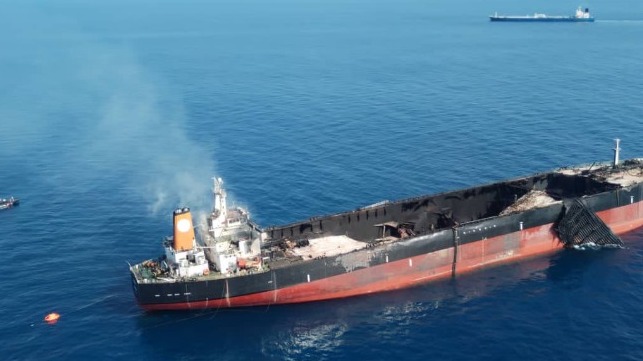IUMI: "Dark Fleet" Tankers Pose New Risk for Marine Insurers

The International Union of Marine Insurers (IUMI) has warned that the growing "dark fleet" of sanctions-evading tankers poses a new threat to the insurance sector, as well as the safety of navigation and the marine environment.
Since the invasion of Ukraine and the creation of a new Western sanctions regime targeting Russian oil exports, tanker operators have been selling older tonnage to anonymous upstart firms in new jurisdictions, like the UAE and India. Reflagged with low-quality flag registries and classed by second-tier, non-IACS class societies, these tankers are reborn for operations in the shadows - outside of the reach of sanctions enforcement. The phenomenon dates back to the imposition of U.S. restrictions on Iranian and Venezuelan oil, but has accelerated rapidly as Russia seeks out new capacity to carry its crude exports.
Since the beginning of the invasion of Ukraine, dark-fleet operators have paid exceptionally generous sums to buy older tonnage from legitimate companies. This has netted enormous profits for some sectors of the industry, creating generational wealth for family-owned tanker firms. It has also created a 600-strong fleet of under-regulated vessels and an array of new risks, according to IUMI, including possible criminal activity and money laundering.
IUMI's legal committee notes that these are largely older ships, and their operating practices do not align with industry standards. Many show signs of improper maintenance, have missed their inspections, or operate with their AIS transponders turned off, raising the risk of a spill or collision. Many others have a "severe lack of insurance," posing financial risk to others in the event of a casualty.

that matters most
Get the latest maritime news delivered to your inbox daily.
For insurers, the hazards are concrete: accidents involving the dark fleet have already occurred, and if a multi-vessel casualty involving a questionable tanker should happen, it is unclear what the impact would be on legitimate insurers. According to IUMI, potential issues could arise in identifying responsibility for wreck removal, paying for pollution response, and arranging compensation for victims.
“There were eight incidents involving sanctioned oil tankers reported in 2022, including the destructive explosion of the aframax tanker Pablo which caught fire in Malaysian waters in May and left three crew members missing," said Ilias Tsakiris. “Because this ship was part of the 600-strong 'dark fleet,' salvors were not able to board. Fortunately, there was no other vessel involved but had this been a collision, or a ship-to-ship transfer, it would have been a completely different story. As it stands, the burnt-out wreck remains at anchor and the owners are impossible to contact, leaving the authorities with a significant headache.”
